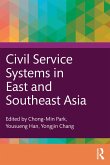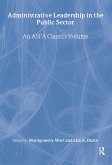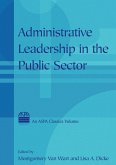Jared J. Llorens (USA Louisiana State University), Heather Getha-Taylor (The University of Kansas School of Public Aff
Public Personnel Management
Contexts and Strategies
Jared J. Llorens (USA Louisiana State University), Heather Getha-Taylor (The University of Kansas School of Public Aff
Public Personnel Management
Contexts and Strategies
- Broschiertes Buch
- Merkliste
- Auf die Merkliste
- Bewerten Bewerten
- Teilen
- Produkt teilen
- Produkterinnerung
- Produkterinnerung
Now in a thoroughly revised 8th edition, Public Personnel Management: Contexts and Strategies focuses on the critical issues and common processes in the management of public sector personnel.
Andere Kunden interessierten sich auch für
![Public Personnel Management Public Personnel Management]() Jared J. Llorens (USA Louisiana State University)Public Personnel Management179,99 €
Jared J. Llorens (USA Louisiana State University)Public Personnel Management179,99 €![Public Personnel Management Public Personnel Management]() Jared J. Llorens (USA Louisiana State University)Public Personnel Management145,99 €
Jared J. Llorens (USA Louisiana State University)Public Personnel Management145,99 €![The Public Administration Workbook The Public Administration Workbook]() Dennis L. Dresang (University of Wisconsin, Madison, USA)The Public Administration Workbook161,99 €
Dennis L. Dresang (University of Wisconsin, Madison, USA)The Public Administration Workbook161,99 €![Public Personnel Management Public Personnel Management]() Public Personnel Management80,99 €
Public Personnel Management80,99 €![Civil Service Systems in East and Southeast Asia Civil Service Systems in East and Southeast Asia]() Civil Service Systems in East and Southeast Asia49,99 €
Civil Service Systems in East and Southeast Asia49,99 €![Administrative Leadership in the Public Sector Administrative Leadership in the Public Sector]() Administrative Leadership in the Public Sector209,99 €
Administrative Leadership in the Public Sector209,99 €![Administrative Leadership in the Public Sector Administrative Leadership in the Public Sector]() Administrative Leadership in the Public Sector69,99 €
Administrative Leadership in the Public Sector69,99 €-
-
-
Now in a thoroughly revised 8th edition, Public Personnel Management: Contexts and Strategies focuses on the critical issues and common processes in the management of public sector personnel.
Produktdetails
- Produktdetails
- Verlag: Taylor & Francis Ltd
- 8 ed
- Seitenzahl: 404
- Erscheinungstermin: 19. Oktober 2025
- Englisch
- Abmessung: 235mm x 191mm x 22mm
- Gewicht: 738g
- ISBN-13: 9781032817811
- ISBN-10: 103281781X
- Artikelnr.: 74172339
- Herstellerkennzeichnung
- Libri GmbH
- Europaallee 1
- 36244 Bad Hersfeld
- gpsr@libri.de
- Verlag: Taylor & Francis Ltd
- 8 ed
- Seitenzahl: 404
- Erscheinungstermin: 19. Oktober 2025
- Englisch
- Abmessung: 235mm x 191mm x 22mm
- Gewicht: 738g
- ISBN-13: 9781032817811
- ISBN-10: 103281781X
- Artikelnr.: 74172339
- Herstellerkennzeichnung
- Libri GmbH
- Europaallee 1
- 36244 Bad Hersfeld
- gpsr@libri.de
Jared J. Llorens is a professor in the Department of Public Administration in the E.J. Ourso College of Business at Louisiana State University, USA. His research focuses primarily on public sector human resource management, with particular interests in compensation, recruitment, and human resource information systems. He previously served as editor-in-chief of Public Personnel Management and has also served on the editorial boards of the Public Administration Review and the Review of Public Personnel Administration . His research has been published in a wide variety of academic journals, including the Review of Public Personnel Administration and the Journal of Public Administration Research and Theory. Dr. Llorens is a fellow of the National Academy of Public Administration and previously held a presidential appointment to the U.S. Federal Salary Council. He has served on numerous boards and councils, including a term on the National Council for the American Society for Public Administration. ¿Heather Getha-Taylor is a professor in the School of Public Affairs and Administration (SPAA) at the University of Kansas, USA. She served as editor-in-chief of Public Personnel Management and is the author or co-author of over 60 articles, book chapters, and other scholarly reports on topics in public human resource management, collaboration, and leadership. Her contributions to the field were recognized with the 2023 Jonathan West Outstanding Scholar Award from the American Society for Public Administration's Section on Personnel Administration and Labor Relations. Dr. Getha-Taylor teaches undergraduate and graduate courses in public management and is the recipient of several teaching awards, including SPAA Faculty Teacher of the Year. In addition to her research and teaching, she serves the discipline and community, including as an editorial board member for public administration journals and served as an appointed member of the Johnson County (KS) and Miami County (KS) COVID Relief Fund Workforce Development Teams.
Part I: Introduction Chapter 1. The World of Public Personnel Management
Chapter 2. Doing Public HRM in the United States Part II: Planning Chapter
3. Thinking Strategically About HRM: Connecting Employees and
Organizational Mission Chapter 4. The HR Role in Policy, Budget,
Performance Management, and Program Evaluation Chapter 5. Defining and
Organizing Work Part III: Acquisition Chapter 6. Recruitment, Selection,
and Promotion Chapter 7. Rewarding Work: Pay and Benefits Chapter 8.
Advancing Diversity in the Public Service Workplace: From Equal Employment
Opportunity to Inclusive Organizations Part IV: Development Chapter 9.
Leadership and Motivation: Connecting Theory and Practice Chapter 10.
Training and Development: Building Capacity for Performance Chapter 11.
Performance Management: Exploring the How and Why of the Appraisal Process
Chapter 12. Ensuring Safe and Healthy Workplaces: Enduring Values, Evolving
Practices Part V: Sanctions Chapter 13. Pursuing Organizational Justice:
Balancing Expectations and Obligations Chapter 14. Collective Bargaining
Part VI: Conclusion Chapter 15. Managing the Workforce of the Future:
Challenges and Opportunities
Chapter 2. Doing Public HRM in the United States Part II: Planning Chapter
3. Thinking Strategically About HRM: Connecting Employees and
Organizational Mission Chapter 4. The HR Role in Policy, Budget,
Performance Management, and Program Evaluation Chapter 5. Defining and
Organizing Work Part III: Acquisition Chapter 6. Recruitment, Selection,
and Promotion Chapter 7. Rewarding Work: Pay and Benefits Chapter 8.
Advancing Diversity in the Public Service Workplace: From Equal Employment
Opportunity to Inclusive Organizations Part IV: Development Chapter 9.
Leadership and Motivation: Connecting Theory and Practice Chapter 10.
Training and Development: Building Capacity for Performance Chapter 11.
Performance Management: Exploring the How and Why of the Appraisal Process
Chapter 12. Ensuring Safe and Healthy Workplaces: Enduring Values, Evolving
Practices Part V: Sanctions Chapter 13. Pursuing Organizational Justice:
Balancing Expectations and Obligations Chapter 14. Collective Bargaining
Part VI: Conclusion Chapter 15. Managing the Workforce of the Future:
Challenges and Opportunities
Part I: Introduction Chapter 1. The World of Public Personnel Management
Chapter 2. Doing Public HRM in the United States Part II: Planning Chapter
3. Thinking Strategically About HRM: Connecting Employees and
Organizational Mission Chapter 4. The HR Role in Policy, Budget,
Performance Management, and Program Evaluation Chapter 5. Defining and
Organizing Work Part III: Acquisition Chapter 6. Recruitment, Selection,
and Promotion Chapter 7. Rewarding Work: Pay and Benefits Chapter 8.
Advancing Diversity in the Public Service Workplace: From Equal Employment
Opportunity to Inclusive Organizations Part IV: Development Chapter 9.
Leadership and Motivation: Connecting Theory and Practice Chapter 10.
Training and Development: Building Capacity for Performance Chapter 11.
Performance Management: Exploring the How and Why of the Appraisal Process
Chapter 12. Ensuring Safe and Healthy Workplaces: Enduring Values, Evolving
Practices Part V: Sanctions Chapter 13. Pursuing Organizational Justice:
Balancing Expectations and Obligations Chapter 14. Collective Bargaining
Part VI: Conclusion Chapter 15. Managing the Workforce of the Future:
Challenges and Opportunities
Chapter 2. Doing Public HRM in the United States Part II: Planning Chapter
3. Thinking Strategically About HRM: Connecting Employees and
Organizational Mission Chapter 4. The HR Role in Policy, Budget,
Performance Management, and Program Evaluation Chapter 5. Defining and
Organizing Work Part III: Acquisition Chapter 6. Recruitment, Selection,
and Promotion Chapter 7. Rewarding Work: Pay and Benefits Chapter 8.
Advancing Diversity in the Public Service Workplace: From Equal Employment
Opportunity to Inclusive Organizations Part IV: Development Chapter 9.
Leadership and Motivation: Connecting Theory and Practice Chapter 10.
Training and Development: Building Capacity for Performance Chapter 11.
Performance Management: Exploring the How and Why of the Appraisal Process
Chapter 12. Ensuring Safe and Healthy Workplaces: Enduring Values, Evolving
Practices Part V: Sanctions Chapter 13. Pursuing Organizational Justice:
Balancing Expectations and Obligations Chapter 14. Collective Bargaining
Part VI: Conclusion Chapter 15. Managing the Workforce of the Future:
Challenges and Opportunities








